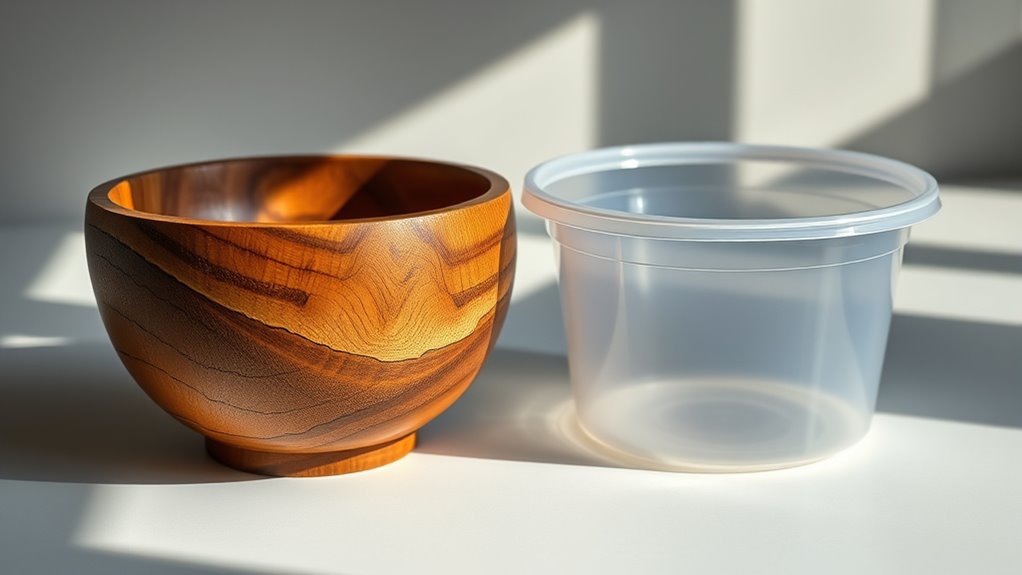Consumers increasingly prefer handcrafted items because they see them as higher in quality, more authentic, and uniquely personal. You’ll notice that handmade products often feature careful craftsmanship, storytelling, and customization options, making them feel more special. People also value their eco-friendly and ethical aspects, supporting local artisans and sustainable practices. As this shift continues, exploring these differences can reveal why more shoppers choose genuine, artisanal goods over mass-produced options.
Key Takeaways
- Consumers increasingly prefer handmade items for their perceived higher quality and craftsmanship.
- Emotional and storytelling value of handcrafted products strengthens consumer attachment and exclusivity.
- Preference for unique, personalized, and stylish items drives demand for artisanal over mass-produced goods.
- Growing awareness of sustainability and ethical practices favors handmade products with eco-friendly methods.
- Market trends show a shift toward supporting small businesses, boosting consumer preference for handcrafted goods.

Have you ever wondered what sets handcrafted items apart from mass-produced products? It’s more than just the way they’re made; it’s how consumers perceive their value and meaning. Research shows that 58% of people believe handmade items are higher in quality than their mass-produced counterparts. This perception stems from the meticulous attention to detail, craftsmanship, and the personal touch that artisans put into each piece.
Handmade items are valued for their quality, craftsmanship, and personal touch, making them more meaningful and unique.
When you hold a handmade product, you can often sense the care and skill behind it, making it feel more special and genuine. Additionally, 55% of consumers find handmade items more stylish, appreciating their uniqueness and character that mass-produced goods often lack.
What truly makes handmade products stand out is the emotional connection they foster. Each item often tells a story—about the artisan, the materials used, or the cultural background—that creates a bond between the buyer and the product. You’re not just buying a thing; you’re purchasing a piece of a larger narrative.
This storytelling, along with the limited quantities in which handmade items are produced, adds a layer of exclusivity that mass-produced items can’t match. Scarcity makes these products seem more desirable, fueling the perception of uniqueness and value.
Sustainability is another factor influencing your preferences. Handmade goods typically rely on more eco-friendly practices, using fewer resources and generating less waste. Because they often require less energy and material, they align better with your desire to support environmentally responsible consumption. Traditional methods often emphasize resourcefulness and minimal waste, further enhancing their sustainability benefits.
As the market for handmade products grows—projected to expand at over 4% CAGR—more consumers are recognizing the importance of supporting small businesses and local communities. When you choose handmade, you help sustain local economies and promote ethical practices. Supporting local artisans not only preserves traditional craftsmanship but also encourages a more sustainable and resilient economy.
Personalization is a key driver behind your favor for handmade goods. Customization options allow you to tailor items to your taste, further elevating their appeal. Your willingness to pay more for these products reflects your appreciation for quality and authenticity.
Handmade items also offer emotional value; they’re often crafted with love and care, making them more meaningful than mass-produced alternatives. This emotional attachment encourages you to see these products as more than just commodities—they become keepsakes or symbols of your individuality.
In the broader economic landscape, your consumer choices support local artisans and encourage industries to adopt more sustainable practices. As you prioritize quality and uniqueness over quantity, you help create a niche market that benefits small businesses.
Environmentally, handmade production uses fewer resources, consumes less energy, and reduces waste. In fact, handmade goods often rely on eco-friendly practices, using fewer resources and generating less waste, making them a more sustainable choice. Additionally, supporting these practices can help foster a sustainable economy that values environmental stewardship. By opting for handcrafted goods, you’re making a conscious decision that aligns with your values of sustainability, authenticity, and personal expression.
Conclusion
As consumer preferences shift like tides, you find yourself drawn to the unique heartbeat of handcrafted items, each piece telling a story only human hands can weave. Yet, the steady rhythm of mass production offers reliability like a well-worn song. Ultimately, your choice is a dance between soul and convenience, a delicate balance where passion meets practicality. In this evolving landscape, you’ll decide whether to chase the fleeting beauty of individual artistry or embrace the comfort of uniformity.









